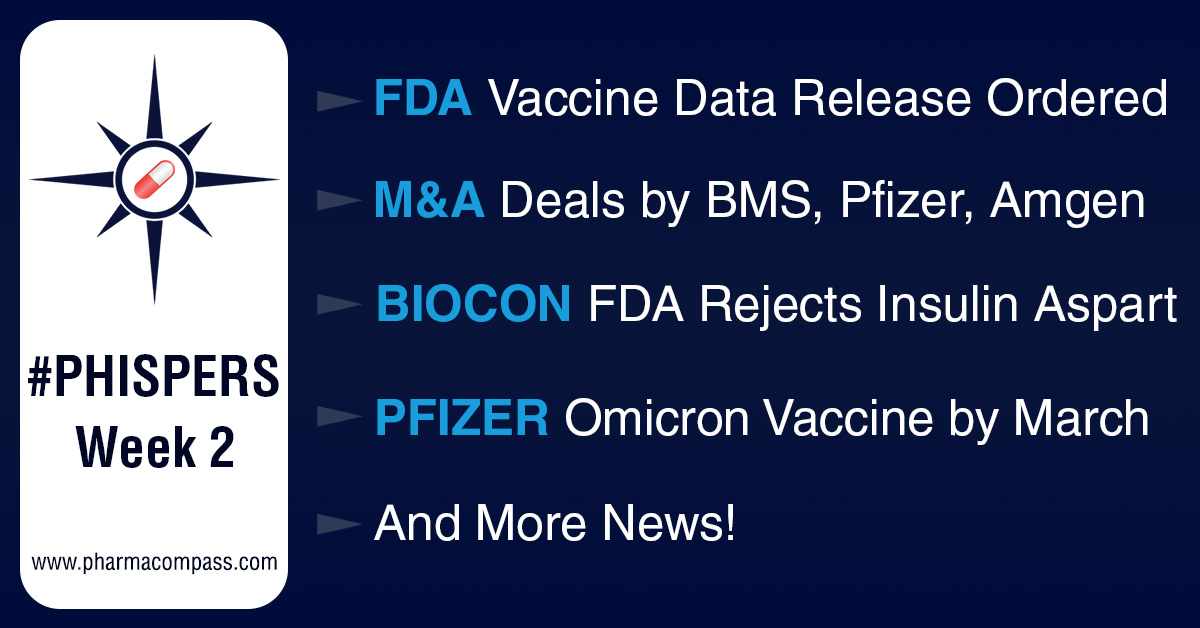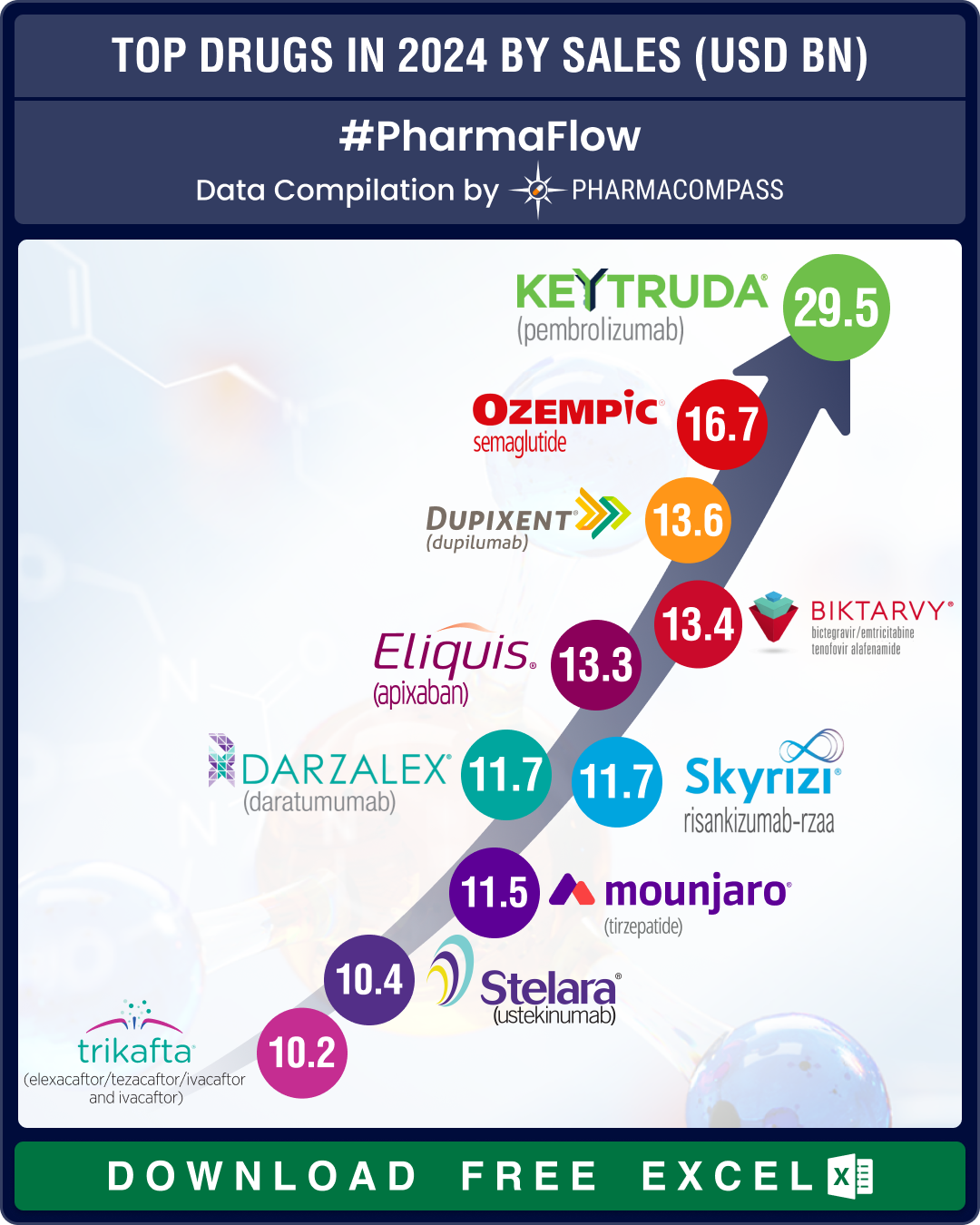
By PharmaCompass
2022-01-13
Impressions: 2063
In Phispers this week, we bring you news that a federal court in the US has paid heed to a plea filed by doctors, scientists and academics seeking more information on Pfizer’s Covid-19 vaccine. With this judgment, the US Food and Drug Administration (FDA) will have to release all data it relied on to license the vaccine within the next eight months, as opposed to its proposed pace that would have taken it 75 years to do the task.
In regulatory news, the FDA has rejected Biocon-Viatris’ application for insulin aspart, a biosimilar of Novo Nordisk’s Novolog, and has sought additional process data in its complete response letter (CRL). Biocon has said it plans to resubmit the BLA while maintaining that the CRL won’t impact the launch of the drug, scheduled for the latter half of this year.
With blockbuster drug Revlimid slated to hit the patent cliff this year, Bristol Myers Squibb plans to launch three new drugs to offset the drop in revenue. It also announced two deals, one of them with Century Therapeutics for US$ 3 billion.
Like last year, the JP Morgan Health Care Conference is being held virtually due to the pandemic. The conference saw a plethora of deals and M&As being announced by pharmaceutical companies. Amongst them was Pfizer, which announced three new deals in the mRNA space, including a US$ 3 billion deal with gene editing firm Beam Therapeutics.
Sanofi brokered a US$ 5.2 billion deal with British firm Exscientia in order to increase its focus on artificial intelligence-driven drug R&D. Another British firm — Adaptate — got acquired by Japanese drugmaker Takeda for an undisclosed amount.
In Covid-news, Pfizer said it plans to ready an Omicron-specific vaccine by March, while also announcing that it is scaling up the production of its anti-viral pill, Paxlovid.
FDA asked to hasten release of approval data on Pfizer’s Covid-19 vaccine
In a ruling, a federal judge in Texas rejected the US Food and Drug Administration’s (FDA) schedule for making public the data it had relied on to license Pfizer’s Covid-19 vaccine — Comirnaty. Instead, the judge imposed an accelerated schedule that would result in the release of all information in about eight months.
The judge was hearing a Freedom of Information Act (FOIA) request filed by a group of doctors, scientists and academics, seeking data on the vaccine to help them “offer solutions and address serious issues with the current vaccine program.”
The FDA will now have to produce all remaining data on Comirnaty at the rate of 55,000 pages per month, much faster than the 500 pages per month it had proposed last November, citing lack of resources. At that pace, the agency would have needed around 75 years to make public the data it had relied on to license Comirnaty.
While recognizing the “unduly burdensome” challenges faced by the FDA, the court concluded “that this FOIA request is of paramount public importance,” as it would assuage the concerns of vaccine skeptics and convince them that the product is safe.
BMS plans new drug launches, deals to counter drop in Revlimid revenue
Bristol Myers Squibb (BMS) is planning a slew of deals and M&As over the next two years to offset the loss of revenue from its blockbuster multiple myeloma drug – Revlimid – which is slated to hit the patent cliff this year. The pharma giant said it expects to have around US$ 45 billion to US$ 50 billion in free cash flow between 2022 and 2024 to spend on a “balanced capital allocation strategy, prioritizing business development and returning cash to shareholders”.
Revlimid — which generated nearly US$ 9.5 billion in the first nine months of 2021 — will face stiff competition from generics starting this year.
In order to make up for the loss in revenue from Revlimid, BMS is lining up three new drugs — CAR-T therapy Breyanzi, anemia drug Reblozyl and a psoriasis hopeful deucravacitinib. The pharma giant said it expects to generate US$ 10 billion to US$ 13 billion in annual sales from these new drugs. By 2029, the company said its new launches could deliver US$ 25 billion or more.
The company also announced two deals. It will pay US$ 100 million in cash to Philadelphia-headquartered Century Therapeutics and invest another US$ 50 million in equity to develop and commercialize four drug candidates to treat blood and bone marrow cancers along with solid tumors. The deal could fetch Century an additional US$ 3 billion in royalties and milestone payments.
The companies will work on candidates for acute myeloid leukemia, a cancer of the blood and bone marrow, and multiple myeloma, which attacks the plasma cells. In another deal, BMS teamed up with biotech ArsenalBio to develop T-cell therapies for solid tumors.
FDA rejects Biocon-Viatris’ application for insulin aspart
Biocon Biologics, a subsidiary of Indian biotech firm Biocon, said the US Food and Drug Administration (FDA) has issued a complete response letter (CRL) to its application seeking approval for insulin aspart, a biosimilar of Novo Nordisk’s diabetes drug NovoLog. The application was filed by Biocon’s American partner Viatris.
The FDA sends a CRL to communicate it has completed its review of a new or generic drug application and has decided to not approve it for marketing in its present form.
Biocon said the agency has asked for additional process data from the company and did not identify any outstanding scientific issues with the product. The company said it intends to address the CRL, but did not specify any timeline for resubmission of data.
The chairperson of Biocon, Kiran Mazumdar Shaw, said she does not expect any impact on the launch of insulin aspart, scheduled for the latter half of this year.
Pfizer bets big on mRNA with three new deals; including US$ 1.3 billion tie-up with Beam
In order to expand and improve on the use of its messenger RNA technology, which made its Covid-19 vaccine such a resounding success, American drug behemoth Pfizer has announced three new deals this week.
In the largest of such deals, Pfizer will pay gene editing company Beam Therapeutics US$ 300 million to conduct research on three undisclosed targets for rare genetic diseases of the liver, muscle and central nervous system. If the research produces any drug candidate, Pfizer will have an option to pick up global rights. Overall, Beam could receive as much as US$1 billion more in conditional payments across the three programs.
In the second deal, Pfizer secured access to Canadian biotech Acuitas Therapeutics’ lipid nanoparticle delivery system for use in its mRNA vaccines and therapeutics for an undisclosed amount. As part of the deal, Pfizer will have the option to license the technology for up to 10 vaccines or therapies.
The third such deal involves California-based Codex DNA. Pfizer will offer milestone payments of over US$ 100 million to Codex DNA to access its novel enzymatic DNA synthesis technology in order to develop new mRNA vaccines and therapeutics. The two companies did not disclose the financial details of the deal.
Sanofi deepens ties with British AI firm Exscientia; Takeda acquires Adaptate
Artificial intelligence promises (AI) to shorten the discovery time for new drugs and increase their chances of success, and pharma giant Sanofi has decided to bet big on AI-driven R&D.
After working with British AI firm Exscientia for five years, Sanofi wants to expand the relationship. As part of the new deal with Exscientia, the drugmaker will pay US$ 100 million upfront with US$ 5.2 billion in potential milestone payments to collaborate and develop up to 15 drug candidates across oncology and immunology.
Exscientia has emerged as a notable player in the nascent AI space in recent years, landing deals with drug developers such as Bristol Myers Squibb and pulling off a mammoth US$ 510 million IPO late last year.
Meanwhile, the French drugmaker will end its long-running partnership with American biotech Sangamo Therapeutics. The two have been collaborating to develop genetic medicines for inherited blood disorders.
Takeda acquires British firm Adaptate: Japanese drugmaker Takeda will exercise its option to acquire UK-based Adaptate Biotherapeutics, which is focused on developing antibody-based treatments for cancer, for a pre-negotiated upfront payment. The terms of the deal and the amount involved have not been disclosed.
The acquisition will help Takeda obtain Adaptate’s antibody-based gamma delta T-cell engager platform, including its pre-clinical candidate and discovery pipeline programs. The gamma delta cell-based therapy is a novel therapy to treat solid tumors and cancer. Adaptate was spun out from GammaDelta Therapeutics in 2019 – a company Takeda acquired in in October 2021.
Amgen, Generate in US$ 1.9 billion bio-bucks deal: US biopharma major Amgen and Generate Biomedicines have announced a research collaboration agreement worth up to US$ 1.9 billion to develop five drugs across several diseases. The collaboration plans to pair Generate’s artificial intelligence capabilities with Amgen’s drug development expertise.
As part of the deal, Amgen will pay Generate US$ 50 million in cash and up to US$ 370 million in future milestones and royalties for each candidate.
In another deal announced on Tuesday, Amgen will team up with biotech firm Arrakis to develop five RNA degrader therapeutics, with the pharma giant retaining an option to develop more. Amgen will shell out US$ 75 million upfront and has promised “several billion dollars” in milestone payments.
Selecta, Ginkgo extend their partnership: Months after announcing a rare disease pact, US-based drugmaker Selecta and cell programming firm Ginkgo Bioworks have agreed to extend their partnership to cover gene therapy delivery. The two will apply Selecta’s platform for developing therapies that mitigate unwanted immune responses and Ginkgo’s cell programming capabilities to develop gene therapy capsids. A capsid is the outer layer that surrounds the nucleic acid in a virus particle. In a financial filing, Selecta said the deal is worth up to US$ 207 million in cash. The press release puts the value at up to US$ 200 million for each product, with the ceiling for the entire deal set at US$ 1.1 billion.
Pfizer may launch Omicron-specific vaccine by March; to raise Paxlovid production
Pfizer could be ready to launch a redesigned Covid-19 vaccine specifically targeting the Omicron variant by March, its chief executive officer Albert Bourla said this week. The drugmaker, along with its partner BioNTech, are working on two versions of their vaccine — one that targets the Omicron variant, and another that would include the previous vaccine as well as the one targeting Omicron.
The company also announced plans to scale up production of its Covid-19 pill — Paxlovid — to 120 million treatments, or roughly 3.6 billion tablets, this year. Bourla said the company is working to add more capacity by the year-end after several countries indicated their interest in stockpiling the treatment.
Meanwhile, European Medicines Agency (EMA) has said it could issue “within weeks” a decision on whether to authorize the use of Paxlovid for treatment of mild-to-moderate Covid-19 in patients aged 12 years or older.
The PharmaCompass Newsletter – Sign Up, Stay Ahead
Feedback, help us to improve. Click here
Image Credit : Phisper Infographic by SCORR MARKETING & PharmaCompass is licensed under CC BY 2.0
“ The article is based on the information available in public and which the author believes to be true. The author is not disseminating any information, which the author believes or knows, is confidential or in conflict with the privacy of any person. The views expressed or information supplied through this article is mere opinion and observation of the author. The author does not intend to defame, insult or, cause loss or damage to anyone, in any manner, through this article.”








